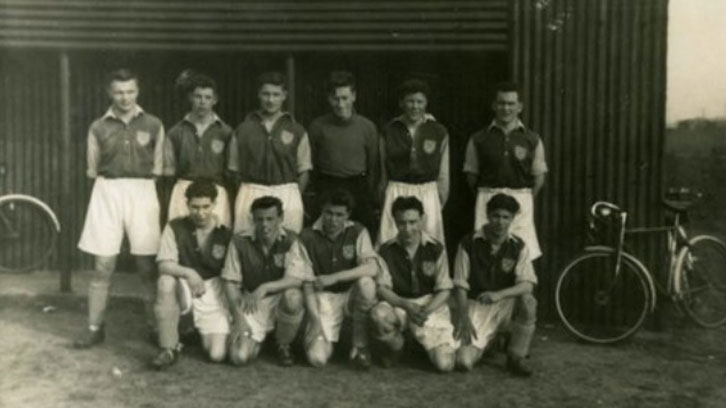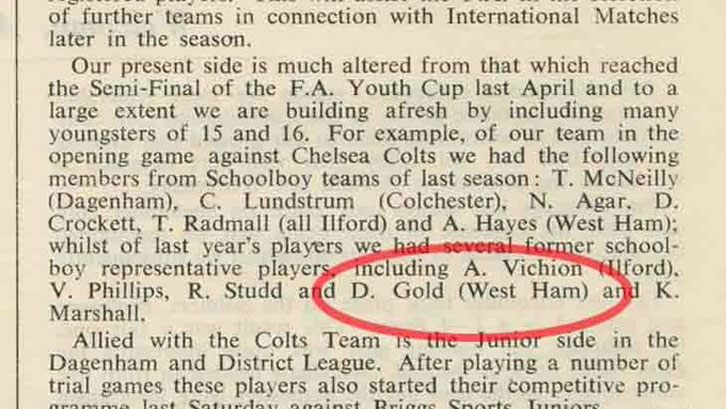
Historian Stuart Allen shares the story of a teenage David Gold making his West Ham United debut 65 years ago this week...
The South East Counties League was formed in 1954 to promote more competition among the youth teams of Football League clubs based in and around London.
In the first season, 1954/55, eleven teams took part, including non-league Bexleyheath.
For West Ham, the competition began with a trip to Hendon in west London to face Chelsea on 4 September.
The Blues would go on to win the title in eight of the first nine seasons and started as they meant to go on, fielding an experienced team against a West Ham side comprising mainly 15 and 16-year-olds.
In the Chelsea XI was winger Peter Brabrook, who would win the First Division title and three England caps while at Stamford Bridge, before joining West Ham in October 1962 and going on to lift the FA Cup in 1964 and both coach and scout for the Hammers for many years.
In the West Ham XI, meanwhile, was a certain David Gold, who is pictured in the team photo above, in the front row on the far right, with his bicycle propped up against the shed.
I was desperate to become a full-time professional, and I thought my time had come when the great Ted Fenton, the famous manager of West Ham United, one of the all-time greats, called me into what I remember as a huge office
David Gold
The future Chairman and his teammates would have been delighted to have gained a 2-1 lead before the more experienced Chelsea took hold of the game and eventually ran out 8-3 winners.
For the record, the West Ham goalscorers were Terry Radmall, Alan Vichion and an own goal.
For most of the Irons players, their time in the South East Counties League side was very brief, as six of them made less than five appearances each, including the young Gold.
Many of the names of the players involved during the season will be unfamiliar to most supporters, but among those who appeared in an ever-changing line-up were goalkeeper Brian Rhodes, John Smith and Malcolm Pyke, who all went on to make first-team appearances.
Smith, for one, was rated as an exceptional talent in his younger days, and he represented England at youth and Under-23 levels and was twice named as reserve for the senior squad in 1959/60.
He later joined Tottenham after 132 first-team appearances and was part of the squad which did the Double in 1960/61 and won the League Cup with Swindon Town in 1969, but sadly passed away, aged 49, in 1988.
Despite the young Smith’s performances, West Ham finished bottom of the final 1954/55 South East Counties League table with just 13 points and four wins from their 20 league matches.

A dream denied
In his autobiography Solid Gold, David Gold recalled his time as a West Ham player, and how close he came to fulfilling his dream of becoming a professional footballer…
“I was selected to play for West Ham Boys just seven months after playing my first game for the school. It was wonderful. It was such escapism going to West Ham United on a Tuesday and Thursday evening for training.
“I loved my days playing football from the moment I first kicked a bundle of rags.
“I played for West Ham Boys for four consecutive years between the ages of 13 and 16 and was selected for every game without missing a match.
“I was also picked for Essex and London Boys and began to dream about what the future might hold for me. I could picture myself running out for the Hammers at Old Trafford or Highbury.
“I remember riding my bike to school as a 14-year-old when a complete stranger, a man of about 40 wearing a grey cloth cap typical of the time, suddenly called out, ‘Hey, Goldie! Well done, son!’
I played for West Ham Boys for four consecutive years between the ages of 13 and 16 and was selected for every game without missing a match
David Gold
“He must have been at the match on Saturday, when we beat East Ham Boys at Upton Park and I scored two of the five goals. I felt ten feet tall when he recognised me. For the first time in my life, instead of an insult I was being complimented. I was no longer a scrounger or a poor boy without any ambition in life. I existed, and it was a wonderful feeling.
“People say you don’t hear the crowd when you are playing, but when I turned out for London Youth at Selhurst Park against Glasgow Youth there were 12,000 people in the ground and I can recall distinctly hearing people call out, ‘Come on Rabbit!’ (‘Rabbit’ was the nickname Gold shared with the speedy West Ham winger Eric Parsons).
“I progressed to the West Ham ‘A’ team, which was a huge stride for a 16-year-old, playing alongside full-time professionals, players I had watched from the terraces. The ‘A’ side was a mixture of first-year professionals and seniors who were trying to find a bit of form or who were working their way back after an injury, players like my great hero Bert Hawkins at centre forward, who I played alongside a number of times. To this day I remember him calling out to me when I got the ball, ‘Goldie, on me ’ead! On me ’ead, son!’
“I was desperate to become a full-time professional, and I thought my time had come when the great Ted Fenton, the famous manager of West Ham United, one of the all-time greats, called me into what I remember as a huge office.
“‘Gold,’ he said, ‘I have had some great reports from Wally St. Pier. I have some forms for you to take home for your parents to sign so you can become an apprentice professional.’ At that precise moment everything that had gone before was forgotten. At last I had achieved my dream.
“At least I thought I had. That was as far as I travelled on my yellow brick road to football stardom, for my father, in his wisdom, refused to sign the forms...”
